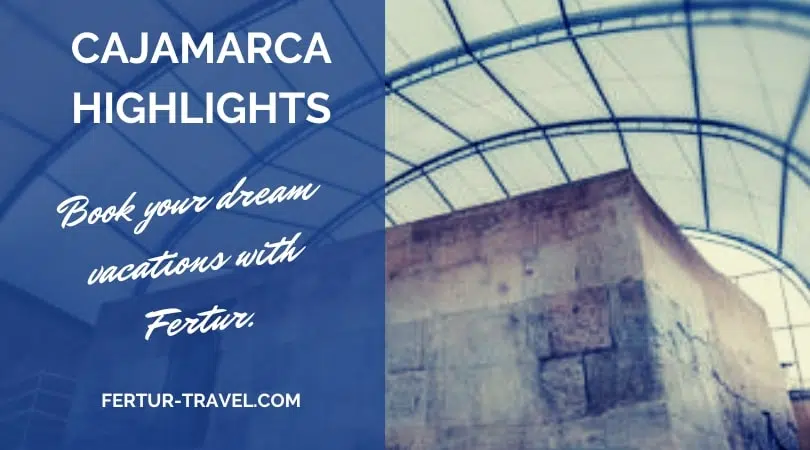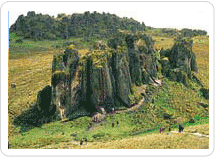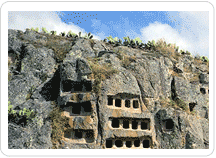
Nestled in the northern highlands of Peru, Cajamarca is a city rich in history, culture, and natural beauty. Known for its colonial architecture, archaeological wonders, and vibrant festivals, Cajamarca offers a unique glimpse into Peru’s past and present.
This comprehensive guide provides detailed insights into the city’s top attractions and excursions, designed to help you fully experience all that Cajamarca has to offer.
Cajamarca’s colonial churches are architectural masterpieces that offer a window into the city’s religious and cultural heritage. Each church boasts unique features and historical significance.
Cajamarca’s colonial mansions, or “casonas,” are grand buildings that reflect the opulence of the colonial era. Key examples include:
Located at the highest point above Cajamarca, the Saint Apollonia Natural Lookout offers panoramic views of the Cajamarca Valley. The site also features pre-Hispanic vestiges, including the “Silla del Inca” (Throne of the Inca), a finely carved stone seat.
The Ransom Room is the only remaining evidence of Incan architecture in Cajamarca. This stone building with slightly slanted walls is a testament to the city’s Incan heritage and its significant role in Peru’s history.
Cumbemayo or Cumbe Mayo is located about 14 miles (23km) from Cajamarca on a slightly eerie stretch of high Andean countryside with eroded rock formations that resemble groups of shrouded people.

Surrounded by a natural stone forest, the Cumbemayo Archaeological Complex is renowned for its aqueduct, an outstanding work of hydraulic engineering dating back to 1000 B.C. The complex also includes the “Sanctuary,” a cliff that resembles a praying friar.
The site also has caves containing petroglyphs, as well as amazingly engineered pre-Inca water channels running for several miles across the bleak terrain.
This intriguing burial site consists of square or rectangular niches carved directly into the rock face of a volcanic hill. The Ventanillas of Otuzco are believed to be associated with the Caxamarca culture, which flourished from 300 to 800 A.D.
However, the archeological evidence suggests this ancient cemetery pre-dates the Caxamarca culture, and probably was influenced by the Huari Empire. Hundreds of galleries and individual niches resembling windows were hewn into the volcanic stone.

The niches are 26 to 33 feet deep, 20 to 24 inches high (8-10m deep, 50-60cm high) and are rectangular or quadrangular in shape. Based on fragments found nearby, archaeologists believe the niches probably were originally sealed with gravestones carved with figures in Haut relief.
Legend has it that the Inca cleared out the niches and used them as storerooms for grain (“collca” in Quechua), redirecting their entrances towards the wind to keep them cool.
The niches lead into a network of dark and mysterious galleries, which appear to have no end, giving rise to myths of secret tunnels that linked Cajamarca to Cusco.
Near the Ventanillas of Otuzco, Tres Molinos Farm is known for its excellent cattle and Peruvian paso horses. The farm also produces high-quality dairy products and features a beautiful hydrangea garden.
Porcón Farm a rural cooperative offering opportunities for agritourism that allow visitors to engage in cultural exchanges and enjoy pristine nature. The farm features hiking trails through dense pine forests inhabited by deer and vicuñas.
Built in 1900, La Collpa Farm is a prime example of Cajamarca’s thriving cattle industry from the early 20th century. Visitors can witness the unique tradition of calling cows by name during milking time.
One of northern Peru’s most fascinating pre-Incan sites, Kuntur Wasi is constructed in the form of enormous terraces with stone stairways. The site offers insights into ancient ceremonial practices.
Located in the Tarras mountain range, Cutervo National Park is a biodiversity hotspot home to numerous plant and animal species. The park is accessible from the city of Chiclayo and offers a wealth of natural beauty to explore.
These hot springs, with temperatures exceeding 72°C (158°F), are renowned for their therapeutic minerals, which are said to benefit bone and nervous system conditions. Baños del Inca provides a relaxing and rejuvenating experience.
A modest Andean village eight miles (13km) southeast of Cajamarca, offers ancient cave paintings and hikes to a beautiful waterfall.
Essentially a farming town, Celendín is famous for its artisans who specialize in making straw hats. The town’s unique charm and traditional craftsmanship make it a worthwhile visit.
Cajamarca is known for its vibrant festivals, each offering a unique glimpse into the region’s cultural traditions.
Cajamarca’s Carnival is a colorful spectacle of dance, costumes, and unique masks. The festivities include playful water fights and the throwing of baby powder, creating a lively and joyous atmosphere.
During Holy Week, the community of Porcón Bajo and other towns such as Contumazá, Cajabamba, and Hualgayoc celebrate with processions. The highlight is the procession of the Lord of the Palms, accompanied by participants bearing crosses and mirrors.
This festival celebrates the patron saint of Celendín with flower petal carpets, fireworks, and processions. The celebration culminates in a traditional bullfight festival lasting five days.
Tourist Week features handicraft expositions, gastronomic festivals, dance contests, and the crowning of Miss Tourism Cajamarca. This event highlights the region’s rich cultural heritage and artisanal craftsmanship.
Held in the Pampa Galeras Barbara D’Achille National Reserve, the Chaccu ceremony involves the traditional shearing of vicuñas, following techniques inherited from the Incas. This event is a celebration of Andean heritage and sustainable practices.
Celebrated in the district of Andamarca, the Water Festival involves the cleansing of canals and pagapu rites, where thanks are given to Pachamama (Mother Earth) and Andean gods. The festival also features traditional scissors dancer performances.
To sum up, Cajamarca is a city that seamlessly blends historical significance, cultural richness, and natural beauty. Whether exploring its colonial churches and mansions, delving into archaeological sites, or participating in vibrant festivals, visitors will find a wealth of experiences to enrich their journey. Join us in discovering the timeless charms of Cajamarca, a destination that promises to captivate and inspire.